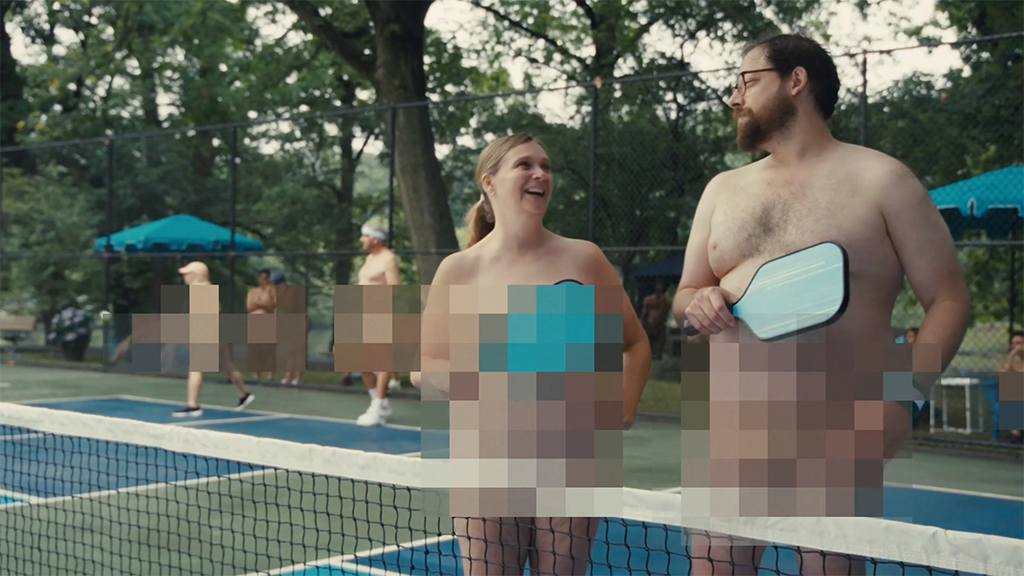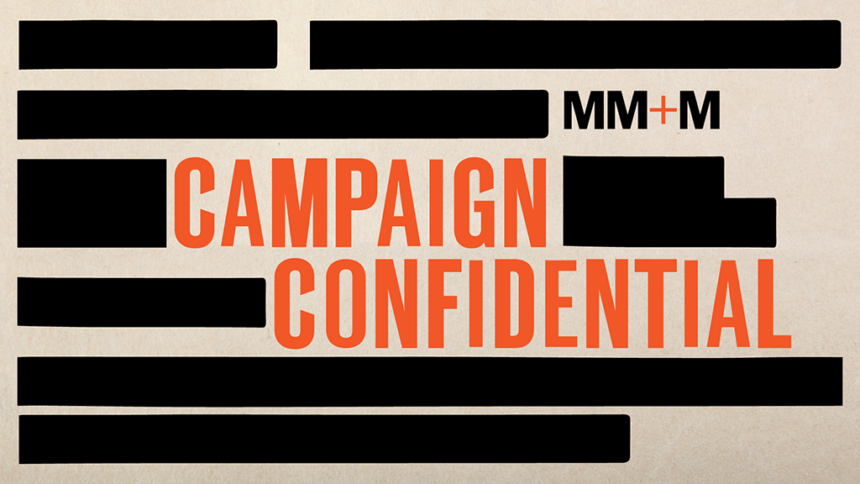It’s a common nightmare scenario we’ve all experienced at one point or another: finding yourself naked in front of a room full of people.
The idea of being on display while unprepared and undressed is a near-universal fear that has been referenced in movies, TV shows and music videos over the years.
However, in the first AOR campaign by the ad agency Cutwater for Intuity Medical and its POGO Automatic blood glucose monitoring, the fear of feeling exposed is used to comic effect.
Privacy and pickleball
In one of two spots that Cutwater created, a nudist couple is shown on a pickleball court.
One partner explains that while she isn’t a private person, her diabetes isn’t something she wants to share with the world via a continuous glucose monitoring (CGM) device.
By leaning into the eye-catching nature of public nudity, Intuity Medical found a way to underscore the message they heard from patients: privacy is paramount.
“One thing that we learned through market research as we were preparing for this campaign launch was that the value proposition about POGO being discreet was compelling for many patients,” Dave Yamauchi, VP of marketing at Intuity Medical explains. “Privacy was important to them and what you see in our not-so-private couple commercial is that [her CGM] is visible. The whole thing stemmed from comments like, ‘I don’t need other people to know I have diabetes. I want to avoid judgment from other people.’”
How that message made the leap to a nudist couple playing pickleball is all part of advertising magic, according to Amy Su, creative director at Cutwater.
“It was helpful to have the customer insight and research because we knew the pain points for [the audience] we were speaking to,” she explains. “We learned about the visibility issue with CGMs and the thought process was essentially, ‘OK, who would hate to have something visible on their bodies?’ You go down that line of thinking and figure nudists would actually hate it.”

Too much burdening patients
Along with patients’ reluctance to share their diabetes diagnosis with the world, another key pain point emerged from Intuity Medical’s consumer research.
Instead of privacy, the issue at hand was the often inconvenient number of supplies — namely lancets and testing strips — of some glucose monitoring devices.
This insight provided the inspiration for the campaign’s other spot, in which its protagonist is preparing to test his glucose by making a cramped bathroom stall a little more cozy with a framed photo and a lavender candle.
Both spots are characterized by a similar deadpan delivery, which Su says is a crucial element to their effectiveness.
“The situations are relatable to our audience and we just brought them to life in a kind of visually humorous way, it’s a little bit more understated” she says. “Visually they come off humorous, but it’s not necessarily what they’re saying, which is more straight. It’s more honest, more serious, but it becomes funny because of what you’re seeing visually and the scenarios that they’re in.”
Campaign’s thematic consistency
While POGO Automatic was approved for marketing by the Food and Drug Administration in 2016, this is Intuity Medical’s first campaign of this scale for the product.
The spots will be seen on media channels including YouTube, Hulu, Paramount+, ESPN and Peacock. The content will also be supported by a social media influencer program as well as branded materials for healthcare providers and professionals.
Yamauchi notes that the humorous tone is a consistent theme throughout all the different iterations of the campaign.
Yamauchi adds that he is pleased with the bold and distinctive tones of both the spots that support the campaign’s mission to raise awareness for diabetes and empower patients living with the disease.
“My team had some objectives in mind with the campaign, whatever it looked like,” he says. “One was to resonate emotionally with customers and another was to be believable, communicating that our product can deliver on its promise.”
At the same time the campaign had to align with the POGO brand personality, which Yamauchi describes as focusing on self-determination, passion and boldness.
Another challenge was to speak in a way that would allow “a small fish” to get attention in a big category but Yamauchi says Cutwater managed to hit all the notes.
“When we saw these ads, it felt right,” he concludes.







